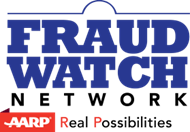AARP Eye Center
FOR IMMEDIATE RELEASE:
Friday, July 10, 2015
Contact: Chaunda Ball, 917-859-0029, cball@aarp.org;
AARP and Google Offer Top 5 Tips to
Prevent Cybercrime
AARP and Google Team Up to Help New Yorkers Age 50+ Stay Safe Online
NEW YORK, NY – AARP and Google want New Yorkers age 50+ to be smart online to keep identity thieves out of their wallets and to protect their personal information. Today, at an event co-hosted by the AARP Fraud Watch Network and Google at Google’s Chelsea offices, the groups released the top five tips that every New Yorker should know to avoid identity theft and keep their passwords, credit cards, and other sensitive financial information safe.

“Online scams are growing in number and sophistication,” warns Rosa Maymi, Manager, AARP Programs. “As greater numbers of people age 50 and over go online for news, to participate in social networks, and to shop and bank, they need to know how to protect their online identity. AARP is thrilled to co-host this educational event with Google and to offer these vital tips to help guard against the growing threat of identity theft,” continued Maymi.
Maymi, along with Hibah Hussain, a public policy analyst at Google, was part of an interactive panel discussion with 150 AARP members in attendance that tackled the biggest threats facing online users, including phishing, malware, tech support scams and public wi-fi networks.
A recent AARP survey found that approximately 25% of 50+ voters in New York City have been victims of identity theft or credit card fraud, and 75% are concerned with becoming a victim of id theft, which ranked as the top concern among all other types of fraud.
To stay safe online, AARP and Google recommend following the advice in each of these tips:
- Be vigilant when using public Wi-Fi: Don’t connect to an unknown public wireless network. Some scammers will set up bogus wireless networks with connection names that are deliberately similar to coffee shops, hotels, or venues offering free Wi-Fi. Speak with an employee at your location to verify their Wi-Fi network before connecting.
- Identify and avoid tech support scams: Scammers often pose as employees of tech companies or online security software providers. They call individuals to inform them that malware or viruses have been detected on their devices. Often, these scammers instruct individuals to click on a provided link to gain remote access to a user's computer files, passwords and other sensitive information. If you receive a call from a tech support person, please hang up. If you're experiencing problems with your computer, you should take your computer directly to the manufacturer or a trusted source.
- Do not hand over personal information via email, text message, or social media communication: Scammers will often pose as well-known organizations or personal contacts in order to prompt you to disclose your username, password, or other personal information. Never enter your username or password when prompted by someone else, whether it’s solicited in an email, a link on a social media network, or a text.
- Do not use the same password for multiple accounts. Choosing the same password for each of your online accounts is like using the same key to lock your home, car and office – if a criminal gains access to one, all of them are compromised. So don’t use the same password for an online newsletter as you do for your email or bank account. It may be less convenient, but picking multiple passwords keeps you safer.
- If you are a Gmail or Google Account user, take the Security Checkup at any time to make sure the safety and security information associated with your account is current. With Security Checkup, users can:
- Provide backup information — like a phone number — so we can get in touch in case you’re locked out of your account.
- Set up 2-step authentication to add an extra layer of security to your account. Think of this like an extra padlock on your door.
- Make sure the recent activity in your account is actually YOUR recent activity.
The AARP Fraud Watch Network offers additional ways to avoid fraud through Watchdog Alerts which notify users of the latest scams popping up in their area and provides resources on what to do if you become a victim of fraud.























































